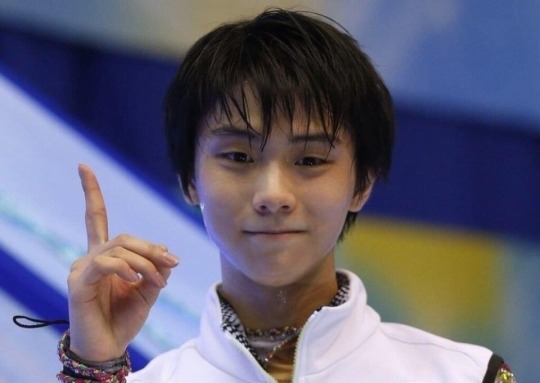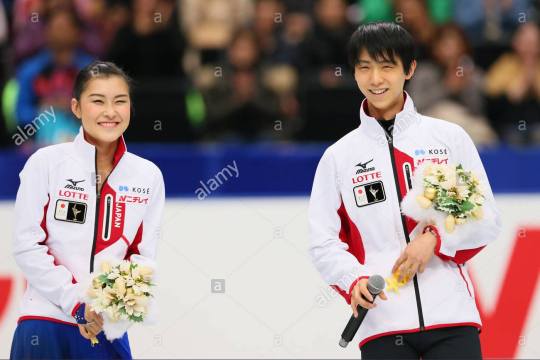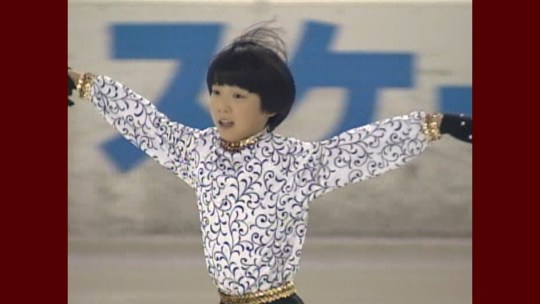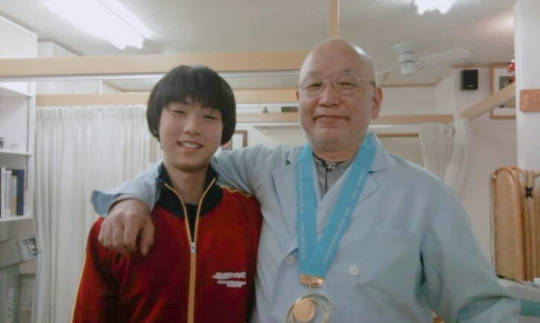#Japanese martial arts inspired by Shaolin kungfu
Photo

Continuing Kikuchi-san's book 'Strongly, beautifully.....'
If you have not read all 6 parts of Chapter 1, please read them first. See my previous posts in tumblr, OR the master post on FB.
Chapter 2, part 1. Fukuoka GPF, 1st time with ID pass
Yuzuru who became a World Championship medalist at just 17 years of age, moved to the Cricket Club in Toronto, Canada. This prominent club, headed by the famous Brian Orser, has choreographers and instructors for land training. In such a unique and favourable environment, Yuzuru continued his training.
After this move across the ocean, he came to my place here about a few times a year. It also had the feeling of coming to greet me upon returning to his hometown.
In the Sochi Olympic season of 2013-14, I received an email from Yuzuru. It was 3 weeks before the 2013 December Grand Prix Final, held in Fukuoka.
"Sensei, can you help me? Can you please be my trainer at GPF Fukuoka?"
His team has a specialised trainer. For the GP series competitions that had just taken place in Canada and France, that trainer had gone with them. I expressed this thought to him.
"There are always some areas that don't go very smoothly, please come and take a look," he replied me by email.
I thought it would be like Rostelecom Cup last time, just help him do taping in the hotel room, but this time he wanted me to go to the venue and see the situation closely.
Because it was a competition in Japan, I thought it was just for this one time, so I agreed, "I know, I know. I will be there."
When I met up with Yuzuru in Fukuoka, I listened to his description; it seemed that he felt there was something wrong with the warm-up exercises.
In figure skating, before putting on skates to compete, there are about 60 minutes of warm-up time. Having listened to suggestions from various people, and also with other skaters' exercises as reference, Yuzuru seemed to have created his own menu of warm-up based on that foundation.
But in recent competitions, the adjustment just before competing did not go that smoothly. I had readily accepted his request to be there, with the words "I know, I know", but now I was in trouble. After all, I only knew about the warm-up for martial arts competitions. For me, before Shorinji Kempo competitions, I usually did some running and low intensity muscle training, just to warm up the body. And also relaxing the muscles and joints to help to prevent injuries. One more thing is to raise the tension level (t/n. or hype yourself up). Going forward to the competition area with the feeling of "I'll show you all some colour*, I'll show you how it's done". That is to say, rousing to an imposing manner is very important.
*(t/n. "Show you some colour" in Chinese is usually said before you beat someone up, haha.)
But, is this way of warming up suitable for figure skating.......With this kind of questions in my mind, I thought about the pre-competition warm-up for Yuzuru.
For me this time, it was different from Rostelecom Cup 2 years ago because I had the ID pass, I could enter the rink side with the athletes, and also places like the warm-up zone and rest area.
"Do you know why we need to warm up? It's to prevent injury," I said to Yuzuru as I instructed him on warming-up exercises, like jogging, sprinting and jumping side to side.
In that warm-up zone, there was also Patrick Chan, running quietly. He was the world's number one figure skater at that time, a first-rate skater that even someone like me who knew nothing about figure skating had heard of him. I felt we may be able to learn many things from a top skater's warm-up, so I observed him earnestly from the side.
Despite using a warm-up method that was suitable for martial arts, Yuzuru broke the world record for the short programme score at this competition. He was also first for free skating, and he conquered GPF for the first time.
Translated by me from Chinese translation by QuailAries@weibo
Photo above: Taken in the K&C of GPF 2013, credits unknown.
-------------------
Chapter 2, part 2. Trainer for 1st Olympics
After this, in the same month, Yuzuru competed in the Japanese National Championships. It was held in Saitama Super Arena, and was also the selection event for representatives to Sochi Olympics the next year.
Even though it was an important competition that involved Olympic entry, Yuzuru seemed very relaxed. Perhaps he had gained confidence from his victory over the king, Patrick Chan, in GPF Fukuoka.
Yuzuru won the Japanese nationals, and the next day, the Olympic team was announced. (t/n. skaters' names omitted)
"Honestly, I'm very happy. But this is just the start line," Yuzuru said this to the media after it was confirmed that he would be going for his first Olympics.
It's so amazing. From the time he was an elementary school student, he has been saying, "I want to compete in the Olympics." Even when I said, "(You're) so noisy, keep quiet for the massage!", he still went on and on, "Olympics, Olympics." Now, that dream had come true.
(Photo below: 23 Dec 2013 Japan nationals, when the Olympic reps were announced. Kanako Murakami and Yuzuru, both just turned 19, were part of the team.)

For the big stage from here on, the Canadian trainer in Yuzuru's team would take charge. This time really, "my work ends here". With these thoughts, I returned to Sendai.
Then this happened a few days later. Out of the blue, Yuzuru's father came to my clinic and handed me a piece of paper, saying, "Please, may we have your help." ("onegaishimasu")
"What's the matter?" I thought and I looked at the paper; it was a registration form for the size of blazer, sportswear and such, for the Olympic delegation.
"We hope you can go along for the Olympics. Although it will take up a long period of about one month......" he made this request. I replied in a panic, "Wait a minute, wait, why me?"
I had joined the team for GPF and nationals, but they were all competitions within Japan. Overseas, international competitions, and something as huge as the Olympics, it's better to have a specialised trainer, I was thinking. Hence, I could not give an immediate reply.
Nevertheless, he said to me, "Sensei, by all means, please."
Translated by me from the original Japanese book by Akira Kikuchi.
(I ordered the book on Amazon Japan and it arrived at the time I was starting to translate this part)
Please consider buying the book if you can; give some support. :)
Photos in my posts are not from the book. I chose them from the internet.
#Akira Kikuchi#Yuzuru Hanyu#corrected one part: not Shaolin Kungfu but Shorinji Kempo#Japanese martial arts inspired by Shaolin kungfu
89 notes
·
View notes
Photo

Continuing to translate Kikuchi-san's book ‘Strongly, beautifully, 30 methods to train’ (book on amazonjp)
Chapter 1, part 3. Adjusting the body's axis during a jump
As Yuzuru the athlete's body continued to grow, the content of our conversation during massage also changed a little.
For example, elementary school 4th grader Yuzuru asked me about taking in water during training and competition.
"Sensei, during training and before a competition, how should we drink water?"
"In our days, no matter how thirsty we were during training, we could not drink water. But that approach is incorrect. Now for all of you, staying well hydrated is crucial," I explained and he listened with great interest.
"Oh? Then can I drink it all up at once?" he said.
"No, no, you can only drink what your body can absorb. If you exceed that amount, won't the water be churning in your stomach? Then you won't be able to jump," I answered. "First, take a sip to moisten your mouth, then take 2 sips; if your throat is still thirsty, you can only take one more sip," I taught him.
There were also questions related to competition.
"Before the 6-minute practice, what is a good way to warm up?”
For figure skaters, just before the actual competition, there is a period of 6 minutes for practice. At that time, I didn't know anything about it, but I have the experience of practising Shorinji Kempo (t/n. Japanese martial arts inspired by Shaolin Kungfu), so I used the warm-up for martial arts as a guide to answer him.
Looking back now, figure skating and martial arts are 2 completely different events..... I had done a very careless thing. But still, Yuzuru was responding "mm" and listening attentively.
Another time, I talked about jumping, Yuzuru looked very interested and listened to me quietly.
"When you jump, your legs must stretch fully and straighten...... (t/n. I just translated the first and last few lines of his jumping theory)..... To use the reaction force from the ground effectively, the axis must not drift. If your legs are fully straightened, the axis will not be off. Therefore, the hip joint and the ankle must be in a straight line."
These words made Yuzuru's eyes light up.
To be honest, it was all about jumping on land, totally different from jumping on ice in figure skating. I realised it after a while and kept quiet.
The great thing about this child is that he can think independently. He can analyse my words in his own way, "stretching my legs straight, is that a good way to jump on ice", he can digest it for himself. For an elementary school child, it's rather amazing.
When he entered Tohoku High School, he said this to me, "When I was in elementary school, the jump knowledge sensei taught me, it's the theory for jumping on land, right?"
"Actually, at that time, I also thought it should be different for figure skating jumps," I could only reply like that.
"But what you told me at that time, to fully straighten my legs, I think I found the feeling," he said.
That child always took my words and tried to understand in his own way, always thinking about how to do it in order to use it for himself.
(t/n. rest of this section is about exercise methods and theories, not translated)
(pic of 4th grader Yuzu above, credits: unknown)
Chapter 1, part 4. Dashing onto the world stage
When Yuzuru started middle school (junior high), travels clashed with training time, so he had to "graduate" from 'torso training class'. But during his elementary school period, the body torso and other necessary abilities had received continuous exercise, to a certain degree.
He participated in 'abilities exercise' every week. I instructed him on "the need to pay attention to the central axis when moving the body". His body's axis became stable, unnecessary movements decreased, and his sense of balance also became better.
Also, I often had him do the training of making different actions according to the signals; the muscles and joints respond quickly and appropriately to information entering the brain through sight (eyes) and hearing (ears); this also helped to raise the senses.
But I instructed other children in the same way too. Yuzuru was different from others in that, from elementary school age, he was sensitive to words like "become stronger", "become better", "win". Perhaps we can even call it 'greed'.
And also, he was very open and frank. The desire to excel at figure skating, to be stronger, to win.... His awareness was so strong. As a result, he listened earnestly to even someone like me who had no knowledge of figure skating. In my words, he searched for any tiny bit that might help him improve.
In junior level, his competition awareness was already very strong.
When he was 15 years old, before he won the Junior World Championship, he told me, "I must win Junior Worlds." He continued, "The competition standard will be very high, so I definitely want to win."
That child had just won the Junior Grand Prix Final, but he was not satisfied with just that.
Before Junior Worlds, he injured his knee. So he asked me to teach him how to do taping, I naturally taught him all that I could.
Even though his competitions are now on the international stage, he still came to my clinic when he returned and after daily training, getting treatments like massage, tui-na, taping and such.
When I saw him at those times, he was just an ordinary boy. Once, I helped to remove the tape around his injured instep, he said, "Sensei, the pain is gone!" and was happily dancing around. He was boasting a little. (t/n. seems like he was boasting about his own abilities because he had done the taping himself.) So I jokingly said, "I can't do this job anymore!" Hearing my words, he pouted his lips. He was already fighting his battles on the world stage, but in front of me, he was just an ordinary junior high student.

Photo: Kikuchi-san is wearing the Junior GPF 2009 gold medal. :) Yuzu had just turned 15 in this photo and had just won the competition which was held in Tokyo that year. (pic credits: unknown)
I don’t have the book yet so I translated from a Chinese translation in weibo, much thanks to QuailAries. (I left out 2 or 3 sentences; they do not affect the meaning and flow of the section.)
Next parts, 1.5 and 1.6, were already posted earlier (cos I translated them first).
#translation of Kikuchi-san's book#Akira Kikuchi#Yuzuru Hanyu#corrected one part: he practised Shorinji Kempo which is based on Shaolin Kungfu
164 notes
·
View notes